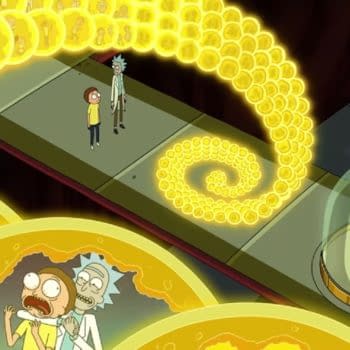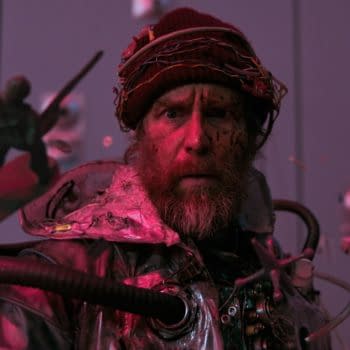Posted in: MGM, Movies | Tagged: from Russia with love, james bond, Pedro Armendariz, Robert Shaw, sean connery
007 Bond Binge: "From Russia With Love"
When James Bond returns in this classic Cold War thriller, From Russia With Love, don't you dare say "Sophomore Slump." While later films Goldfinger and Thunderball would dominate the box office, win Academy Awards, and become the templates for future Bond films, From Russia With Love remains the film that those who worked on the Bond films all point to as their favorite.
And as No Time To Die gets pushed back to November, at least we can take our time going through the Bond catalog at a more leisurely pace.
From Russia With Love is one of the more iconic early Bond films, but is still relatively grounded in reality. Bond is just a spy, the Cold War is the major background and reason for the action, and it's problematic as hell. From portrayals of the Romani people to Bond straight up slapping his love interest in the face, it's a perfect example of the good and bad of early James Bond films.
Our film opens with Bond being stalked by an unseen assailant, who ends up sneaking up behind him, overpowering him and garrotting him. Is Bond dead?!? No, but it's been an elaborate training exercise for assassin Red Grant (Robert Shaw). We're introduced to SPECTRE and their unseen leader, who plans to use Bond, Grant, and the Russians to pit the Soviets against the West, steal the Soviets' new decryption machine, and sell it to the highest bidder. It's such a classic bad guy move, as he explains using his fighting fish: he'll use them to injure one another, and then swoop in and kill the victor, demonstrating as he feeds one of the fish to his waiting cat. (PETA definitely does NOT approve of this scene.)
Bond arrives in Istanbul and meets the local head of intelligence, Ali Kerim Bey (Pedro Armendariz). He is a particularly shining light in this film, from how his mistress literally saves his life by drawing him away from his desk to an oh-so-convenient bed in his office (what exactly kind of spy operation is this?!?!) which saves his life when a Russian bomb goes off, to when he and Bond do the Max/Furiosa thing on taking a shot with a sniper rifle, Armendariz is as bright a shining star here as Connery. This was, tragically, Armendariz's final film, as he shot most of this movie dealing with painful, advanced-stage cancer.
It's unfortunate that the film takes Armendariz, a renowned Mexican actor, and casts him as a Turk in an "all brown people are the same" sort of role. That's problematic but par for the course when Dr. No is engaging in blatant yellowface and Orientalism. But what is truly unforgivable is its treatment of the Romani people, referring to them over and over "gypsies"– an ethnic slur for Romani which should find its way into lexiconical trashbin but is still, unfortunately, commonly used.
While visiting a Romani camp, Bond is "treated" to both a belly dancing display and also a fight between two women. Apparently they're both fighting over the same man (that's the only thing women should fight over, amirite?) and their battle (to the death!) will determine the winner. After the Russians and Bulgarians overrun the camp, trying to get at Bey and Bond, our man James is resting in his tent, and he is then "presented" with the two women and told he should decide between the two. Fade to black… and this is just gross.
This section of the film is just so impossibly hard to watch. It's supposed to be sexy and show us what a "cool guy" James Bond is, but it's just not. And this is the rub of Bond. There's a school of thought that "it was a different time and we shouldn't judge." Ok. But the fact is we're still watching these films in a modern context. And it's important to note the cultural impact these films had on the sexual politics of an entire generation of Baby Boomers who went to the theaters and saw these representations of masculinity and how men and women should act. So when Harvey Weinstein tries to defend himself by saying "I didn't invent the casting couch," we can understand that these things don't exist in a vacuum. If a 13 yr old Weinstein saw From Russia With Love in theaters, it's extremely likely it helped mold his perceptions of sex and how men and women should act. So while maybe it's hard to judge these films with our modern context, it's also important to interrogate how these depictions have reverberated through the following decades.
And one of these ways is the representation of various people on screen. Giving white women suntans and pretending they're Romani is still not ok. Pretending a Mexicans are the same as Turks, as in the case of Armendariz, is not ok. This film's treatment of women is not ok.
If Armendariz is the film's shining star, Robert Shaw is its dark center. Red Grant is such a perfect foil for Bond as a brute and a criminal. While pretending to be a gentleman spy, he still orders the wrong wine with dinner– a key clue for Bond to his role as an imposter– but he still gets the better of 007 on several occasions. Indeed, through the whole film, he's playing a weird guardian angel role, clearing out other antagonists so Bond can continue his mission. But Shaw is so charming and so menacing– a combo only an actor of his caliber could pull off– and ends up providing a template for every other Teutonic thug James Bond would encounter over the next several decades. There's even an argument to be made that Daniel Craig's "James Blonde" is really more Robert Shaw as Red Grant than Sean Connery as 007.
And what would From Russia With Love be without the love aspect? While Tatiana Romanova (Daniela Bianchi) is ordered to seduce Bond as part of a mission, and Bond goes into it knowing it's a trap, it still seems that a real affection develops between the two of them. Unfortunately, it's doused in a lot of 1960's chauvinism and some incredibly inappropriate dialogue, as well as the aforementioned slap in the face.
It also became a template in so many ways for future Bond films. The scene between James and Tatiana in his hotel room is iconic and indeed was used for screen tests for future "Bond girls." The twist, of course, is this is being filmed by SPECTRE through a one-way mirror next to the bed. While never really explored by the film, this could be taken as an indictment on our prurient interests in voyeuristically wanting to watch Bond seduce various women. Of course, there's no actual nudity or even implied on-screen sex, but we still want to watch. Are we, the audience, the bad guys in all of this?
But the central conceit of the film, and a question which the film never satisfyingly answers, is whether Bond would choose the girl or the mission. This question seems to loom over the entire narrative, but James Bond the man never has to truly make this choice. While he seems to gravitate towards the job being his priority, it's impossible to tell if his detachment is merely a 60's playboy misogyny or actual professional detachment. But by the end, he seems far more taken with Romanova, and she with him. One major flaw with From Russia With Love is it never truly delves into this.
Speaking of the film's flaws, this movie has more false endings than Return of the King. While the real climax of the film is a close-quarters fight in a train compartment between Bond and Grant, for some reason the film decides there needs to be a helicopter fight and a boat chase. They're ridiculous and absolutely unnecessary. However, a final scene in Venice where ubervillain Rosa Klebb (Lotte Lenya) shows up to steal the Lecter machine and fight Bond gives a final denouement to Tatiana's character arc. I'll take character development over ridiculous theatrics any day. Cutting this fat from this film's final act would take a really good Bond film and make it one of the best.
Up next is Goldfinger, one of the granddaddies of early James Bond films. Until then, stay inside and hide from coronavirus, binge some James Bond movies, and remain shaken, but not stirred.














